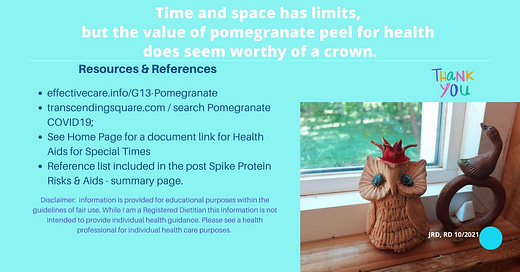Pomegranate for mitochondrial support (and zinc for a healthy weight too!)
Pomegranate promotes removal of defective mitochondria, which might benefit PCOS then, or Parkinson's Disease and other mitochondrial conditions. Also zinc finger proteins and bitter taste receptors.
Pomegranate phytonutrients have also been found to help protect the health of mitochondria by promoting the removal of defective ones. (Tan, et al, 2019) This could help protect against diseases that can be associated with aging such as Parkinson’s Disease which can be caused by defects in mitochondrial DNA. (Park, et al, 2018)
That might help in PCOS too then.
Mitochondrial DNA is different than cellular DNA, mitochondrial DNA matches the mitochondrial DNA of the mother while cellular DNA is formed from half the mother's cellular DNA and half the father's cellular DNA).
*Quick post, I’m trying to hyperfocus on my academic paper topic and put blinders on for everything else.
Current trouble - what belongs in a Table, and what really needs its own section?

Example, this probably needs its own section:
Whole fruit products may have more health benefits than single isolates of pomegranate. Modulation of the microbiome may be involved.
Much of the research regarding health benefits of pomegranate have focused on the ellagic acid component, a study comparing a supplement of ellagic acid to an equivalent portion of pomegranate juice found similar absorption but more health benefits from the juice, suggesting other bioactive phytonutrients provide some of the health benefits. (Bioavailability and bioactivity of free ellagic acid compared to pomegranate juice, (Long, et al, 2019), *Noted a decrease in leptin levels - elevated leptin levels and leptin resistance is associated with obesity. (Ahima, 2008)
Bitter taste receptors stimulate hormone glucagon-like peptide 1 (GLP-1), (Kok, et al, date), which promote satiety through interaction with ghrelin and leptin, resulting in inhibition of glucagon and increased insulin secretion. (Ronveaux, et al, 2015) Leptin also stimulates GLP-1 and is low in obesity, (Anini, et al, 2003), zinc deficiency would cause a lack of bitter taste receptors as Zinc finger proteins are needed for gene transcription of odor and taste receptors, (Sekine, et al, 2012), and many other proteins including genes transcribed by other nuclear transcription factors. (Mackeh, et al, 2018) Zinc deficiency can impact gene transcription by retinoid X receptors (RXR) and 27 other types of gene transcription factors, so deficiency of zinc can negatively impact stem cell differentiation in neonatal or adult neurogenesis. (Morris and Levenson, 2013)
Processed foods tend to have had the bitter tasting phytonutrients removed to increase consumer acceptance.
Bitter tasting Phenols in fruit may promote weight loss, varying with the type of fruit. Pomegranate is helpful. Bitter taste receptors (Tas2rs) may be involved.
Phenolic compounds have been found to have weight loss/anti-obesity benefits including: “Specific isolated phenolic compounds such as resveratrol, caffeic acid, naringenin, proanthocyanidins, catechins, and cyanidin are known anti-obesity compounds found in fruit [17,85,86,87,88].”, Paradoxical Effects of Fruit on Obesity, (Sharma, et al., 2016) Gallic acid is a phenol and caffeic acid is present in pomegranate: “The gallic acids, chlorogenic acid and caffeic were the predominant phenolic compounds.” (Mahmoud and Ibrahim, 2013)
Caffeic acid (Frank, et al, 2007) and many other pomegranate phytonutrients are bitter tasting.
Bitter taste receptors (Tas2rs) increase glucose tolerance, improve weight and dyslipidemia, and decrease insulin resistance, in part by stimulating production of the hormone glucagon-like peptide 1 (GLP-1); animal-based study on hops isohumulones. (Kok, et al, date)
The elderly and chronically ill may have zinc deficiency as an underlying causal factor, as bitter taste receptors on immune cells and within the kidney and elsewhere in the body affect health. Supplementation at higher than standard recommendation may be needed for at least three months to see improvement in taste and odor sensation, (Kodama, et al, 2020), and other chronic symptoms may improve also.
Addition —> Overcrowded Tables break the interior decorating rule of thumb of only three items per surface, visually pleasing and easier to dust and use the surfaces for temporary needs.
The 50,000 plus words currently includes copies of several of my related posts and the main and other reference lists, so the word count is meaningless at this point, just funny. There is a 12,000 word-limit for the text of the article which does not include the Tables, Figures, Reference List or Abstract. The kicker the body of the paper should include “Subsections relevant for the subject” - how to make it all cohesive? and concise?
Showing that “nociceptive pain” - the theme of the special journal supplement I am submitting too - that nociceptive pain can be due to multifactorial problems, needing multiple solutions, is my plan of action. Goal: a large concise overview without getting into too much of the biochemical minutia of retinoid metabolism or other topics - not my scope of practice or room in 12,000 words, instead point out which other papers handle those subjects well.
*and how wonderful that nature gave us the pomegranate - it provides multiple solutions for our health and our microbiome’s, all within one bittersweet package.
Disclaimer: This information is provided for educational purposes within the guidelines of Fair Use. It is not intended to provide individual guidance. Please seek a health care provider for individualized health care guidance.
Partial Reference List
(Park, et al, 2018) Park JS, Davis RL, Sue CM. Mitochondrial Dysfunction in Parkinson's Disease: New Mechanistic Insights and Therapeutic Perspectives. Curr Neurol Neurosci Rep. 2018 Apr 3;18(5):21. doi: 10.1007/s11910-018-0829-3. PMID: 29616350; PMCID: PMC5882770. https://www.ncbi.nlm.nih.gov/pmc/articles/PMC5882770/
(Tan, et al, 2019) Tan S, Yu CY, Sim ZW, Low ZS, Lee B, See F, Min N, Gautam A, Chu JJH, Ng KW, Wong E. Pomegranate activates TFEB to promote autophagy-lysosomal fitness and mitophagy. Sci Rep. 2019 Jan 24;9(1):727. doi: 10.1038/s41598-018-37400-1. PMID: 30679718; PMCID: PMC6346015. https://www.ncbi.nlm.nih.gov/pmc/articles/PMC6346015/







How do you use the pomegranate ?
Is there an easier way to get the pomegranate benefit? I see some supplements around. Are those any good, or would I actually have to buy a dehydrator, after finding some pomegranates, which I haven't seen anywhere, and then scrape out the inner pith and preserve it somehow? Ugh....exhausted just thinking about it.